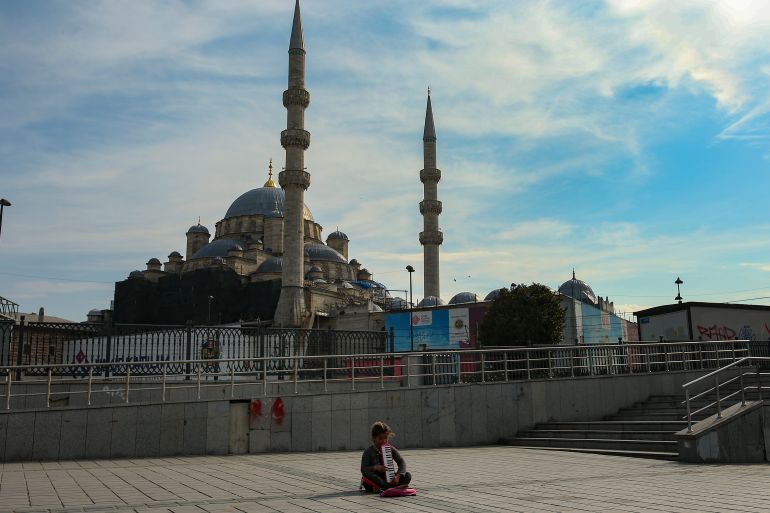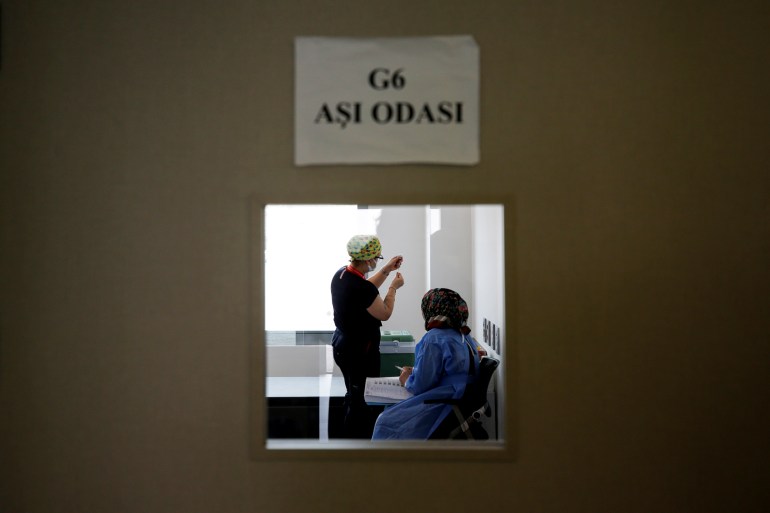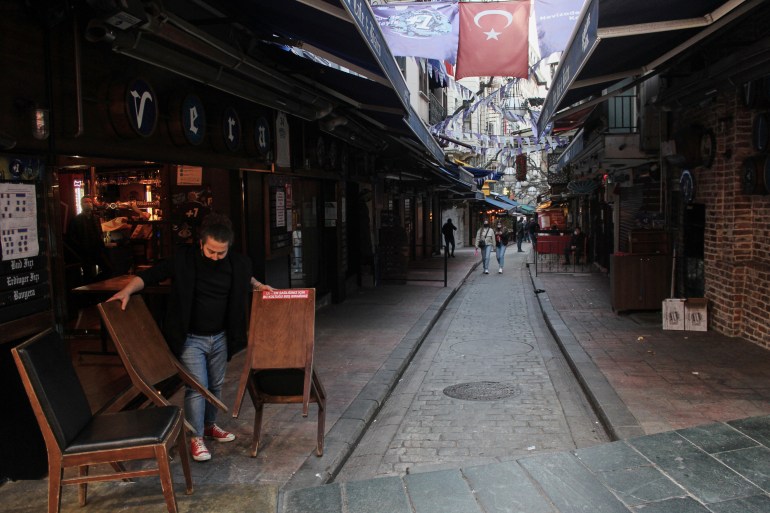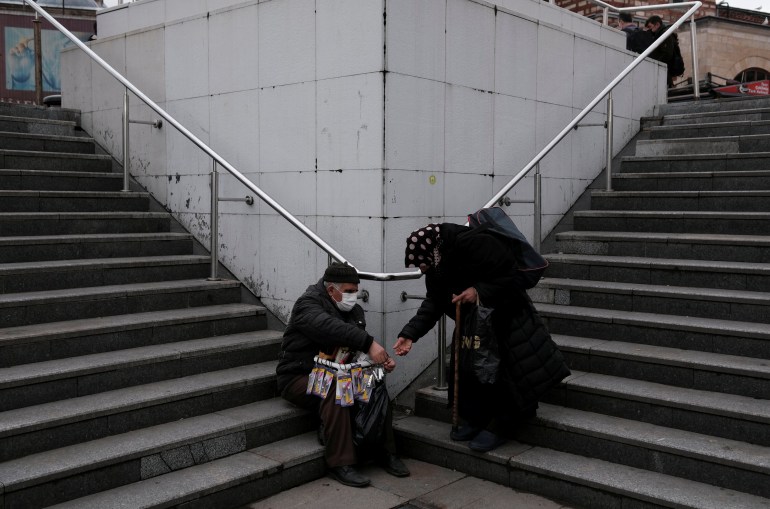What is the real extent of Turkey’s COVID-19 crisis?
While new restrictions were imposed, experts accuse the government of concealing the real magnitude of the pandemic.

Istanbul, Turkey – Medical professionals warn that Turkey’s COVID-19 crisis could be even more severe than official statistics suggest, as new restrictions come into effect to tackle record case numbers and Russia bans flights to the country.
President Recep Tayyip Erdogan announced new measures on Tuesday after Turkey recorded 59,187 new cases the day before, among the highest in the world per capita and more than double the daily figure reported two weeks prior.
Keep reading
list of 4 itemsTurkey reports highest daily COVID-19 cases since pandemic began
Erdogan says Turkey ‘determined’ to cut interest rates
Turkey tightens COVID restrictions after surge in infections
The restrictions will be evaluated in two weeks and include the nightly street curfew being moved forward by two hours to 7pm and a ban on non-essential intercity travel, which doctors say is key to transmission. Indoor dining at cafes and restaurants and weekend shopping hours had already been restricted to limit socialising during the holy month of Ramadan.
Medical professionals say the move does not go far enough, however, pointing out that crowded areas such as malls are still open and workplaces have been largely overlooked, bar a one-hour shortening of the day for public sector workers.
Dr Vedat Bulut, general secretary of the Turkish Medical Association (TMA), said the government has prioritised profits over saving lives in its handling of the crisis, with cases spiralling since previous restrictions were eased in early March. He said they had been too late in redoubling measures, and as a result there had been hundreds of preventable deaths.
“The health ministry never accepted advice from professional organisations, such as the Turkish Medical Association or the Turkish Pharmacists Association,” he said.
“The management of a pandemic should be visioned, preventative and scientific. However, in our country, the priorities were the profits of businessmen, factories and the finance system, and even sometimes national security reasons. The real data was not shared with the public and so they are unaware of the true extent of the problem.”
The Turkish government denied the accusations.
“We categorically reject those allegations. Turkey adheres to the same standards in reporting as other countries and shares information with the public in a transparent manner. The World Health Organization, among others, praised Turkey’s efforts to fight the pandemic,” a senior Turkish official told Al Jazeera.

Bulut said restrictions should include a 14-28 day full lockdown and the closing of all crowded, enclosed areas such as factories and shopping centres. He also said his organisation is preparing to release a report in the coming weeks that shows the death rate from coronavirus is roughly double what has been officially reported.
The report includes excess death rates from across Turkey compiled from municipality figures. E-government data from the Istanbul Metropolitan Municipality, which oversees the country’s most populous city, shows there were 7,162 more deaths between March 12, 2020 and October 18, 2020 than the average figure for the same period between 2015 and 2019, Bulut said, and 3,190 deaths were attributed to COVID-19. This is an excess figure of 3,972.
According to mortality figures from Johns Hopkins University, Turkey’s death rate of about 35,000 to just under four million cases is among the lowest of the 20 countries worst affected by COVID-19. Reasons given for this over the last year include universal healthcare and lockdowns for the over 65s, meaning working-age adults make up the bulk of cases.
Bulut said, however, the heavy workload of government data officials, bad health policy, and the inadequate software used to register cases is contributing to misleading figures.
Dr Fark Hassan Var from the southern city of Adana, for example, who had been in intensive care for months with COVID-19 but who no longer tested positive, died at the end of March. His death was automatically recorded as natural causes, despite a doctor’s order seen by Al Jazeera for medication to treat COVID-19 symptoms dated three days prior. His family said the TMA is now fighting to have his death certificate changed.

On Monday, Health Minister Fahrettin Koca said on Twitter there had been no significant increase in hospital occupancy and that bed rates are at 59 percent and 67.4 percent in intensive care units, but this is also contested by medical professionals.
Dr Necmettin Unal of Ankara University’s medical department told local media there are only two intensive care COVID-19 wards in Istanbul and both are struggling with high admissions and a lack of effectively trained staff. He said with intubation rates very high, the large influx would mean they would be unable to treat new cases if the crisis was not tempered quickly.
Turkey came under fire last year for underreporting cases by excluding those who were asymptomatic, which it admitted to and changed the practice. However, medical groups have continued to contest that official figures were far lower than the real case numbers, with individual voices often being labelled as “terrorists” by the government.
The balance between prioritising public health and the economy is a difficult one in a country already struggling with spiraling poverty rates. According to government statistics, 250,000 people registered as unemployed in February alone and short-term work allowance payments to support people whose workplaces could no longer function because of COVID-19 were recently halted, leaving millions without a formal income.

The economic impact of the depreciation of the lira since 2017 and a rate of inflation of more than 16 percent has been compounded by coronavirus hitting Turkey’s tourism industry, a revenue stream it is heavily reliant on. China suspended flights from Turkey last week because of concern over the current wave of cases, while Russia announced it is to restrict flights to and from Turkey between April 15 to June 1.
It is a particular blow to tourist hotspots such as Bodrum and Antalya, which had been expecting a summer boom. In 2019, Turkey welcomed 45 million foreign tourists, of which seven million were Russian, but the total was less than 13 million in 2020.
The Moscow Times reported half a million Russians would be unable to take planned trips because of the new flight cancellations, and growing political tensions between the two countries over Ukraine are also thought to have contributed to the move.
The Turkish government has blamed the UK variant for 85 percent of its current cases and has assured the public it expects 30 million doses of the BioNTech vaccine to be delivered by June. But it has also said it will offer “no jab” tourism to visitors from the United Kingdom.
Health Minister Koca said on Monday that 18 million vaccine doses have been administered so far and Turkey “has administered the most in the world”, although global statistics do not support the claim.